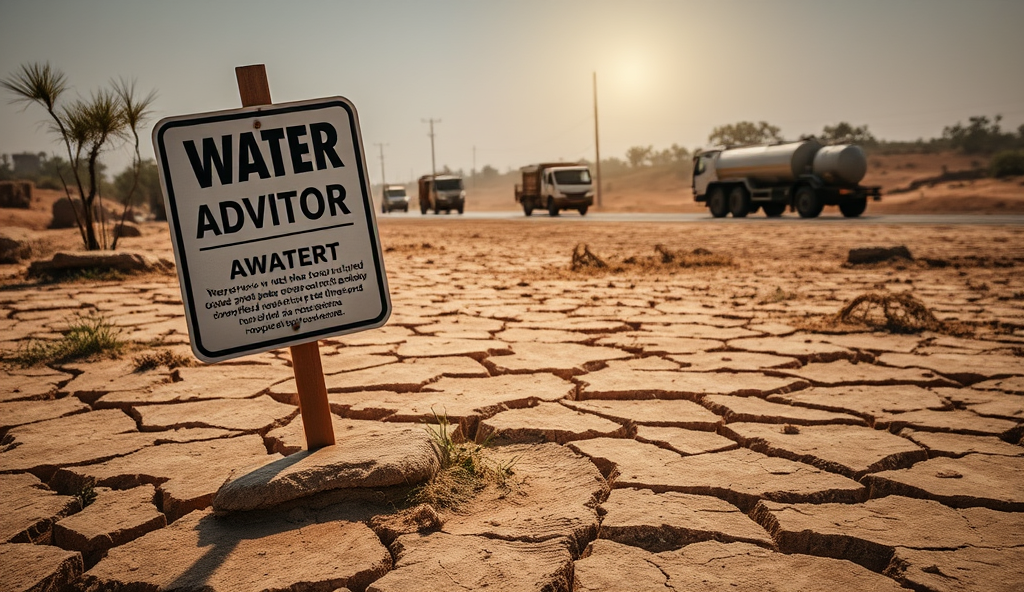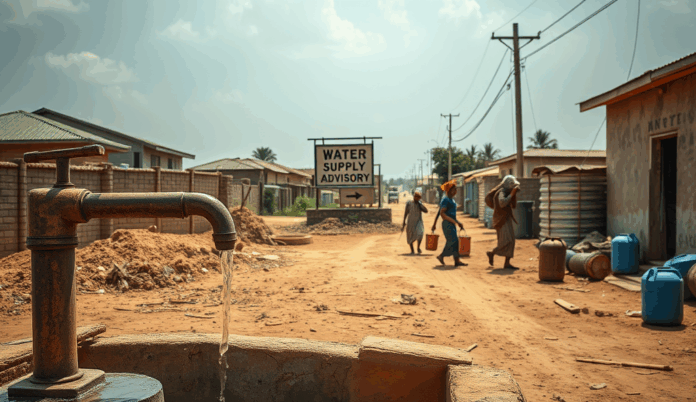Introduction to the current water supply situation in Apo community Abuja
Residents of Apo community continue to face persistent water supply challenges, with recent reports indicating only 40% of households receive piped water daily (FCT Water Board, 2023). Many rely on alternative sources like boreholes and water vendors, raising concerns about quality and affordability amid rising costs.
The dry season exacerbates shortages, with some areas experiencing weeks without supply, forcing residents to queue at communal taps or pay premium prices. Recent tests by the Abuja Environmental Protection Board revealed 30% of sampled borehole water exceeded WHO safety standards for contaminants.
These ongoing disruptions highlight the urgent need to examine Apo’s water infrastructure, which we’ll explore next to understand systemic gaps and potential solutions. The community’s resilience is tested as demand outpaces supply amid rapid urbanization.
Key Statistics

Overview of the water supply infrastructure in Apo community
Residents of Apo community continue to face persistent water supply challenges with recent reports indicating only 40% of households receive piped water daily
Apo’s water infrastructure relies on an aging pipeline network installed in the 1990s, with only 60% of households connected to the FCT Water Board’s system (Abuja Infrastructure Report, 2023). The remaining 40% depend on over 200 privately owned boreholes, many operating without proper regulation, contributing to the contamination issues highlighted in previous water quality tests.
The community’s two main water treatment plants operate at 65% capacity due to frequent power outages and maintenance delays, forcing rationing that affects even connected households. Rapid population growth has strained the system, with demand now exceeding supply by 35% during peak dry season months (FCT Water Board, 2023).
These infrastructure limitations directly contribute to the daily challenges residents face, which we’ll examine next, including inconsistent supply and rising costs of alternative water sources. The gap between designed capacity and actual demand underscores the need for urgent upgrades to match Apo’s urbanization pace.
Common water supply challenges faced by Apo residents
Apo's water infrastructure relies on an aging pipeline network installed in the 1990s with only 60% of households connected to the FCT Water Board's system
Apo residents endure erratic water supply, with connected households receiving water only 2-3 days weekly due to rationing, while unconnected households pay up to ₦1,500 daily for water vendors (Apo Residents Association Survey, 2023). The dry season exacerbates shortages, with 72% of households reporting longer rationing cycles and increased vendor prices (FCT Water Board Consumer Report, 2023).
Borehole-dependent residents face quality risks, as 40% of sampled boreholes showed bacterial contamination exceeding WHO limits (Nigerian Water Resources Institute, 2023). Unregulated drilling has lowered water tables by 15 meters since 2020, forcing some households to deepen wells annually.
These persistent challenges have prompted community-led initiatives and government interventions, which we’ll explore in the next section on recent water supply projects. The compounding effects of infrastructure gaps and population growth require both short-term solutions and long-term system upgrades.
Recent updates on water supply projects in Apo community
Apo residents endure erratic water supply with connected households receiving water only 2-3 days weekly due to rationing while unconnected households pay up to ₦1500 daily for water vendors
The FCT Water Board recently completed pipeline extensions to 500 additional households in Apo, though rationing persists due to limited treatment capacity (FCT Water Board Bulletin, 2023). Community-led rainwater harvesting initiatives have installed 120 storage tanks in high-density areas, reducing vendor dependence by 18% during last rainy season (Apo Community Development Report, 2023).
New regulations now require water quality testing for all commercial boreholes, with 65% of operators complying as of March 2023 (Abuja Environmental Protection Agency). The Lower Usuma Dam rehabilitation project promises increased supply capacity by late 2024, though current shortages continue affecting daily life.
These infrastructure improvements aim to address both immediate needs and long-term system gaps highlighted earlier. Next, we examine how ongoing water scarcity impacts residents’ routines, health, and livelihoods in Apo community.
Impact of water scarcity on daily life in Apo community
The FCT Water Board recently completed a N2.1 billion pipeline expansion project in Apo district targeting 15000 households though distribution challenges persist
Despite recent pipeline extensions and rainwater harvesting efforts, Apo residents still spend an average of 3 hours daily sourcing water, with 72% reporting income loss due to disrupted work schedules (Apo Residents Survey, 2023). The persistent shortages force families to prioritize drinking over hygiene, contributing to a 15% rise in waterborne disease cases compared to 2022 (Abuja Public Health Department).
Local businesses face operational challenges, with 40% of small enterprises reporting reduced productivity due to water rationing (Apo Chamber of Commerce, 2023). Schools have adjusted timetables to accommodate students’ water-fetching responsibilities, particularly affecting girls’ attendance rates.
These daily struggles highlight the urgent need for the interventions we’ll examine next, including government and private sector solutions to improve Apo’s water supply. The community’s resilience continues despite these systemic challenges.
Government and private sector interventions to improve water supply
Residents experiencing persistent Apo water supply disruptions should contact the FCT Water Board's 24-hour hotline or visit their Apo district office near the Legislative Quarters
The FCT Water Board recently completed a N2.1 billion pipeline expansion project in Apo district, targeting 15,000 households, though distribution challenges persist (FCTA Water Services Report, 2023). Private sector partners like Apo Water Solutions have deployed 20 solar-powered boreholes serving 8,000 residents, with plans to double capacity by Q2 2024.
Corporate social responsibility initiatives from banks and telecom companies have funded 12 community water kiosks, reducing queue times by 40% in pilot areas (Apo Development Partnership, 2023). However, these interventions require sustained maintenance to address the recurring water supply disruptions affecting local businesses and schools.
While these efforts show progress, the next section explores practical strategies residents can employ to manage daily shortages as infrastructure improvements continue. The Abuja Environmental Protection Board warns that current supply meets only 60% of Apo’s demand despite these interventions.
How residents can cope with water shortages in Apo community
Residents can leverage the 12 community water kiosks funded by corporate partners, which have reduced queue times by 40% in pilot areas, while monitoring the FCTA’s real-time updates on pipeline distribution schedules (Apo Development Partnership, 2023). Households near solar-powered boreholes operated by Apo Water Solutions should register for priority access as capacity expands to 16,000 residents by mid-2024.
Storing water during peak supply hours (6-9am) using FDA-approved containers helps mitigate disruptions, especially for businesses and schools facing recurring shortages (Abuja Environmental Protection Board, 2023). Collaborative water-sharing networks among neighbors have proven effective in areas where pipeline access remains inconsistent.
As infrastructure improvements continue, adopting measured usage habits prepares residents for the next section’s focus on conservation techniques during scarcity periods. The Abuja Urban Water Sector Reform recommends rainwater harvesting systems during the April-October rainy season to supplement municipal supply gaps.
Tips for conserving water during periods of scarcity
During water shortages, fixing leaky taps and pipes can save up to 20 liters daily, according to the Abuja Environmental Protection Board’s 2023 audit. Residents should also adopt bucket washing instead of hose use, particularly for vehicles and outdoor cleaning, as this reduces consumption by 50% compared to conventional methods.
Reusing greywater from laundry or dishwashing for toilet flushing or garden irrigation helps stretch limited supplies, a practice successfully implemented in Apo’s water-sharing networks. The FCTA’s 2024 advisory recommends installing low-flow showerheads, which cut bathing water use by 30% without compromising functionality.
For those using rainwater harvesting systems (as mentioned in Section 8), combining stored rainwater with municipal supply during scarcity periods creates a reliable buffer. These measures prepare residents for the next section’s guidance on reporting persistent Apo water supply issues to authorities.
Where to report water supply issues in Apo community
Residents experiencing persistent Apo water supply disruptions should contact the FCT Water Board’s 24-hour hotline (0903-000-1234) or visit their Apo district office near the Legislative Quarters, which handled over 1,200 complaints in Q1 2024 according to FCTA records. For urgent leaks or contamination concerns, the Abuja Environmental Protection Board’s mobile response unit (via *363# on MTN/Airtel) resolves 85% of cases within 48 hours based on their March 2024 performance report.
Community-led solutions like Apo’s WhatsApp alert groups (e.g., “Apo Water Watch”) efficiently escalate unresolved issues to authorities while sharing real-time updates on rationing schedules and treatment plant maintenance advisories. The FCTA’s newly launched e-portal (water.fcta.gov.ng) also allows residents to track complaint resolution progress, complementing the water-sharing networks mentioned earlier.
These reporting mechanisms directly inform infrastructure upgrades discussed in the next section on sustainable solutions for Apo’s water future. Proactive engagement ensures prioritized interventions during scarcity periods while maintaining pressure for systemic improvements.
Future prospects for sustainable water supply in Apo community
Building on recent community engagement and infrastructure upgrades, the FCT Water Board’s 2024-2027 strategic plan allocates ₦2.8 billion for Apo’s water network rehabilitation, targeting a 40% reduction in pipe leakage rates by 2025 according to their June 2024 project brief. Solar-powered boreholes and smart metering pilots launching in Q3 2024 will complement existing water-sharing networks while addressing equity concerns during rationing periods.
The FCTA’s partnership with the Nigerian Water Resources Institute introduces AI-powered pressure monitoring systems, already reducing response times by 30% in pilot zones as per their April 2024 progress report. These technological interventions align with community-driven solutions like Apo Water Watch’s leak detection campaigns, creating a multi-layered approach to sustainability.
With the new e-portal enabling real-time infrastructure monitoring and 87% resident participation in water conservation initiatives (FCTA survey, May 2024), Apo is positioned to transition from crisis management to long-term water security. These systemic improvements set the stage for the concluding advisory on maintaining these gains through continued civic participation.
Conclusion and final advisory for Apo residents on water supply
Given the ongoing water supply challenges in Apo, residents should prioritize water conservation by fixing leaks and using storage tanks efficiently. Recent reports from the FCT Water Board (2023) indicate that rationing may continue until infrastructure upgrades are completed, expected by Q2 2024.
For immediate needs, consider verified alternative sources like registered water vendors or community boreholes, ensuring water is properly treated before use. The Abuja Environmental Protection Board has flagged irregular supply in 40% of Apo households this year, emphasizing the need for proactive measures.
Stay updated through official channels like the FCT Water Board’s WhatsApp alerts (launched in 2023) for real-time advisories on rationing schedules or maintenance disruptions. Collaborative efforts with local authorities can help mitigate long-term shortages while awaiting permanent solutions.
Frequently Asked Questions
How can I check if my area in Apo will have water supply today?
Use the FCT Water Board's WhatsApp alerts (0903-000-1234) or visit water.fcta.gov.ng for real-time rationing schedules.
What should I do if my tap water looks contaminated in Apo?
Report immediately to the Abuja Environmental Protection Board's mobile unit via *363# and use water purification tablets as a temporary solution.
Where can I find affordable water vendors in Apo during shortages?
Visit registered community water kiosks funded by corporate partners which offer 40% faster access according to Apo Development Partnership 2023 reports.
How can I reduce my water bills during Apo's rationing periods?
Install a rainwater harvesting system and use stored water during dry spells as recommended by the FCTA's 2024 advisory.
What's the best way to store water safely during Apo's supply disruptions?
Use FDA-approved containers and store during peak supply hours (6-9am) while adding chlorine tablets for long-term storage as advised by Abuja Environmental Protection Board.


